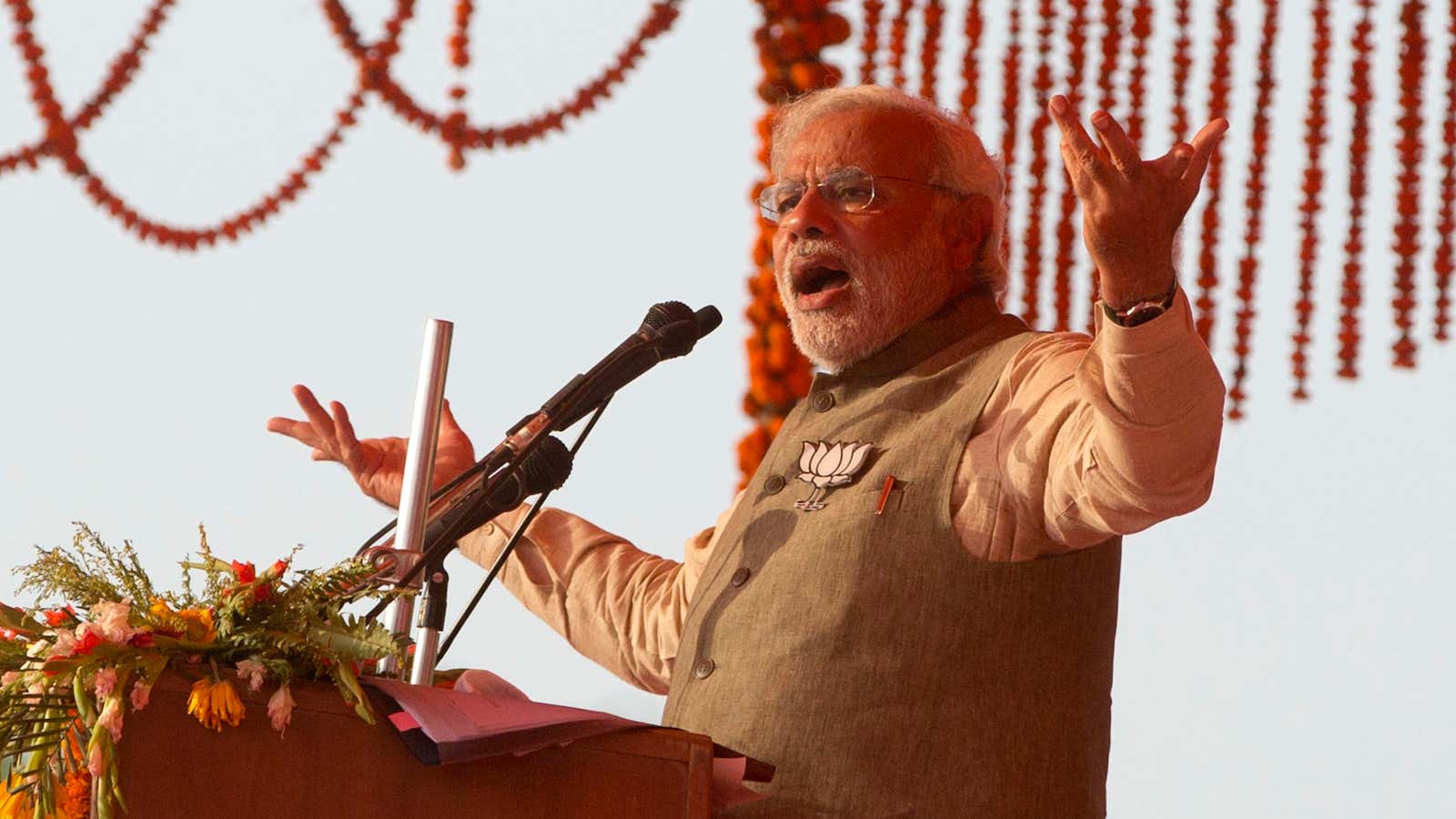Narendra Modi, a self-made politician who sold tea at train stations as a young man, appears to have led the Bharatiya Janata Party into a mammoth victory. For the first time in three decades, a single party has potential to occupy a majority of seats in the Indian parliament.
His victory comes at the end of a high-voltage campaign that he used to slam the incumbent Congress party-led government and promise rapid economic growth, good governance, and a regime that is agnostic to religious identity. That last plank was an attempt to ride over apprehensions about his record during the horrific 2002 communal violence in Gujarat, in which a majority of the victims were Muslim.
Modi’s leadership has handed BJP, a conservative right-wing party, the best electoral showing in history, far surpassing the highest past tally of 182 seats. His ascent also has left the Indian National Congress, the country’s grand old party of independence and incumbency, in shambles, with the worst electoral tally in its long history. The defeat might not even allow it to claim the position of the leader of opposition in India’s lower house. The party’s performance might raise challenges to the dynastic leadership of the Nehru-Gandhi family that has mostly helmed it since independence.
Here are four other ways Narendra Modi just changed the course of politics as usual:
Rare chief minister to enter prime time
Modi will be the only the second prime minister to have served as a chief minister of a state before getting the top job. That means there is guidance about his future performance by way of his three terms (15 years) as Gujarat chief minister. That is a record that businesses and foreign investors like, for prompt clearances, excellent infrastructure and unambiguous decision-making.
Indeed, markets rallied as early trends emerged. The Bombay Stock Exchange’s bellwether Sensex index rallied and crossed 25,000 for the first time. Business leaders have complained bitterly about the so-called policy paralysis that had set in during the second term of the incumbent government, from high-profile corruption scandals to a crisis of leadership. The inability to push policies through, said prime minister Manmohan Singh, was due to the “compulsions of coalition politics.” Investors expect that a Modi government that enjoys majority in Parliament will push through major economic reforms, cut red tape, and fast-track clearances, and generally make India a better place to deploy capital.
A break from coalition era
The era of coalition governments, where parties with disparate agendas get into a marriage of convenience to form a government, is over. The BJP will be free to make decisions and pursue policy as it deems fit, without having to first take time to build consensus. If the party gets a majority by itself, it will also have greater leverage in negotiating with its alliance partners for key ministerial and cabinet positions. Modi will in fact be the first prime minister in 30 years who will enjoy near-complete freedom in picking his team of ministers.
Traditional calculations went awry
While the final breakups are not yet in, urban and rural voters alike seem to have voted for Modi’s premiership and against the Congress that heralded unprecedented welfare spending through programs meant for the poor. Modi’s victory also cut through all calculations of caste politics, once considered the inviolable matrix that determined electoral prospects.
Muscular foreign policy
Modi has always advocated a more muscular approach to national security, and has criticized the UPA government for going soft on internal and external challenges. Pakistan and China will likely watch closely as Modi, who dropped out of high school and later completed a master’s degree through a distance learning program, goes about governing India. Even though China is a traditional military rival to India, Modi has a fascination for that country’s economic rise, and has welcomed Chinese investors to Gujarat and has gone on tours there. With the United States, Modi will likely share an uneasy equation, as the country has denied him a visa due to his record during the Gujarat riots. Even as the European Union, UK, France and other Western powers warmed up as elections drew to a close, the US did not change its stance.
